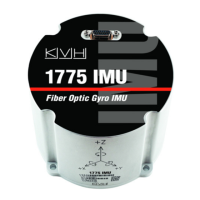This document contains proprietary information of KVH Industries, Inc. and neither this document nor said proprietary information shall be
published, reproduced, copied, disclosed, or used for any purpose without the express written permission of a duly authorized KVH
representative.
1) Reducing the baud rate from the default increases the time duration of the data being output from the
unit. If the baud rate is decreased by too much, it may result in an inability to achieve the set data rate.
(Refer to Section 9.1 for recommended baud rate/data rate limits.) Baud rate will set to default for
Config-RST-IN signal assertion. Baud rate will not change for RSTCFG command.
2) The data rate command (=DR) directly controls the data output rate when the MSYNC is configured for
IMU, which is the default. If the external MSYNC signal is configured (=MSYNC,EXT), any data output
rate from 1 to 5000 Hz is available and controlled by user request. However, the user is responsible for
ensuring the output filters are appropriately set. See the entry named “Output Request
Synchronization” in this table.
3) Delta angle differs from rate of rotation in that it uses the rate of rotation over the time since the last
data output to compute the angular displacement (it integrates the rate of rotation over time).
4) The three axes of rotation are coincident with the linear acceleration axes. Positive rotation is a
counterclockwise rotation about an axis when viewed from +∞ along that axis (see Figure 9.1). Linear
acceleration polarity is such that the IMU will report +1 G due to Earth gravity when its positive axis is
up. The rotation matrix only applies to gyro and accelerometer data. Magnetic data in output Format C
is not affected.
5) Any matrix will be accepted by the unit. It is up to the user to ensure that the matrix is a valid rotation
matrix and does not result in any scaling issues (e.g., entering =axes,4,0,0,0,1,0,0,0,1 would make the
X axis measurements four times as large as they should be). This is not intended as a means of
changing scale factors.
6) The MSYNC,EXT mode will automatically select the Uniform Averager type filtering. Interaction with
the =DR and filtering commands is command-order specific. The user should refer to appropriate
sections to describe these interactions.

